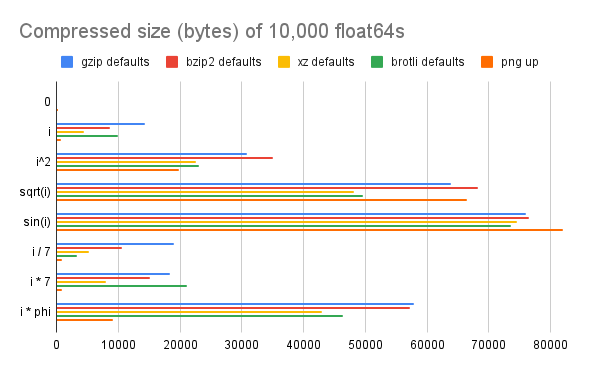Compressing floats
Okay so if you had a bunch of packed binary floats, would they compress well?
If they would repeat, then sure.
What about the natural numbers nonnegative integers lmao 0, 1, 2, …?
Or simple sequences?
Here are my results on 10,000 64-bit floats. Various sequences, various compression tools.

| a[i] | gzip defaults | bzip2 defaults | xz defaults | brotli defaults | png up |
|---|---|---|---|---|---|
| 0 | 112 | 47 | 144 | 14 | 248 |
| i | 14,293 | 8,642 | 4,376 | 9,963 | 643 |
| i^2 | 30,847 | 35,016 | 22,636 | 23,065 | 19,827 |
| sqrt(i) | 63,875 | 68,199 | 48,124 | 49,680 | 66,426 |
| sin(i) | 76,016 | 76,503 | 74,580 | 73,576 | 82,047 |
| i / 7 | 19,086 | 10,670 | 5,332 | 3,378 | 937 |
| i * 7 | 18,342 | 15,080 | 8,052 | 21,203 | 935 |
| i * phi | 57,872 | 57,239 | 42,924 | 46,418 | 9,139 |
Notes:
- Uncompressed size is 10,000 * 8 = 80,000 bytes.
- sqrt(i) and sin(i) are reminiscent of “nothing-up-my-sleeve numbers” used in cryptography.
- i * phi (phi being the golden ratio here) according to this video that I keep thinking about would keep the fractional part from congregating around any particular value
- I didn’t have the usual brotli command line tools, so I wrote a little script to pipe data through the library that comes with Node.js.
- png up is
convert -size 8x10000 -depth 8 -define png:compression-filter=2 gray:- png:-from ImageMagick. Image formats tend to have systems to support gradients, so I was wondering how this would do.
My last post was about either Resources in Diablo Immortal or The fear of not being able to program your own Markdown parser while doing all your writing in Markdown. Find out which.